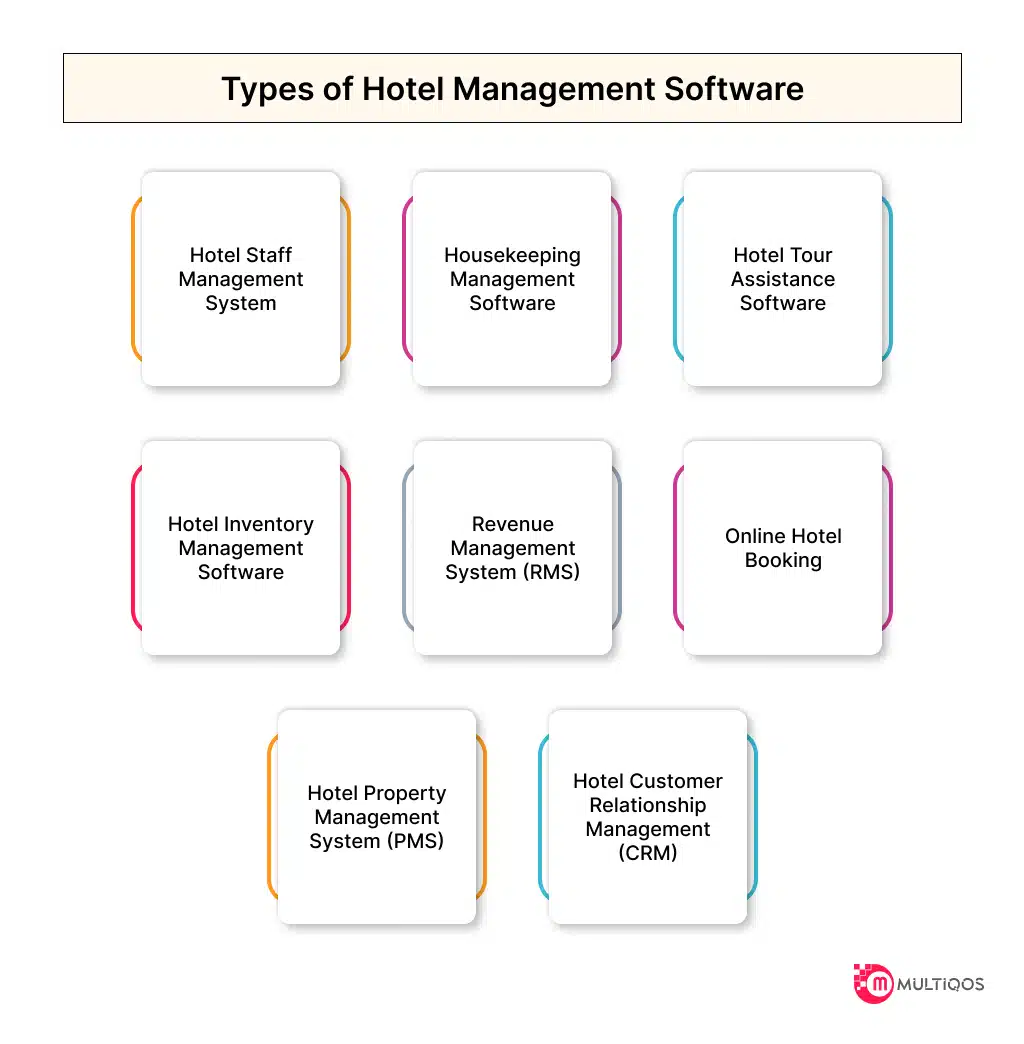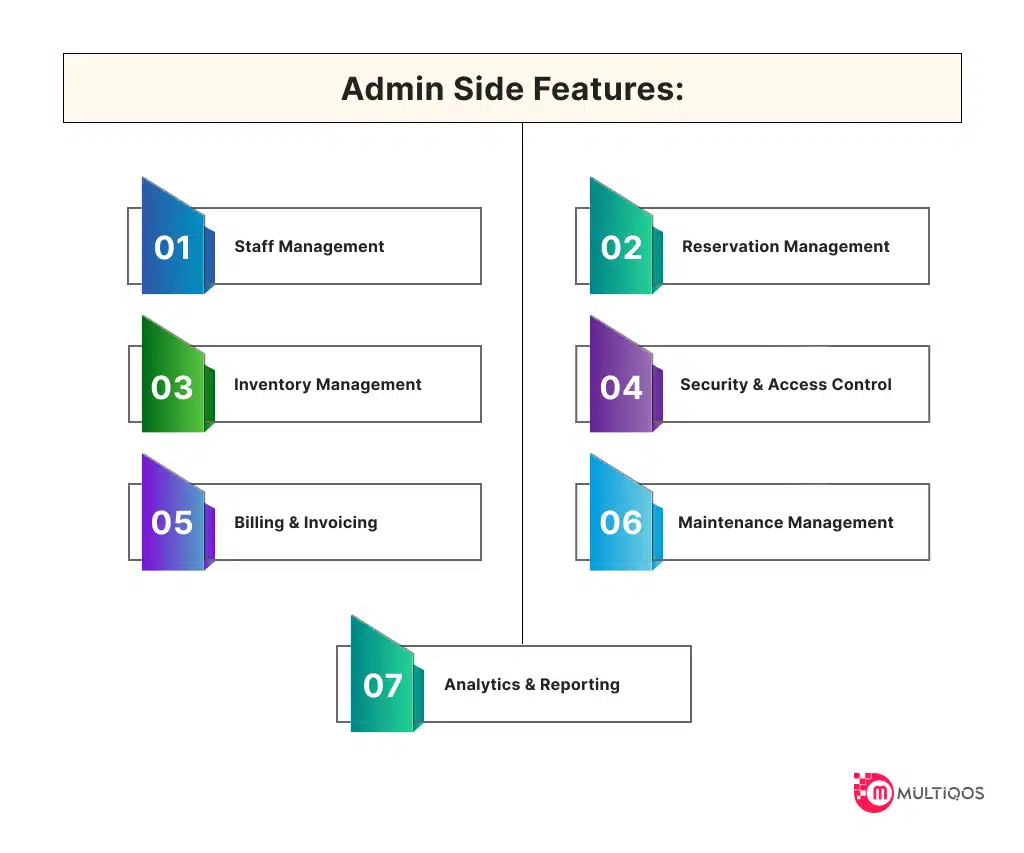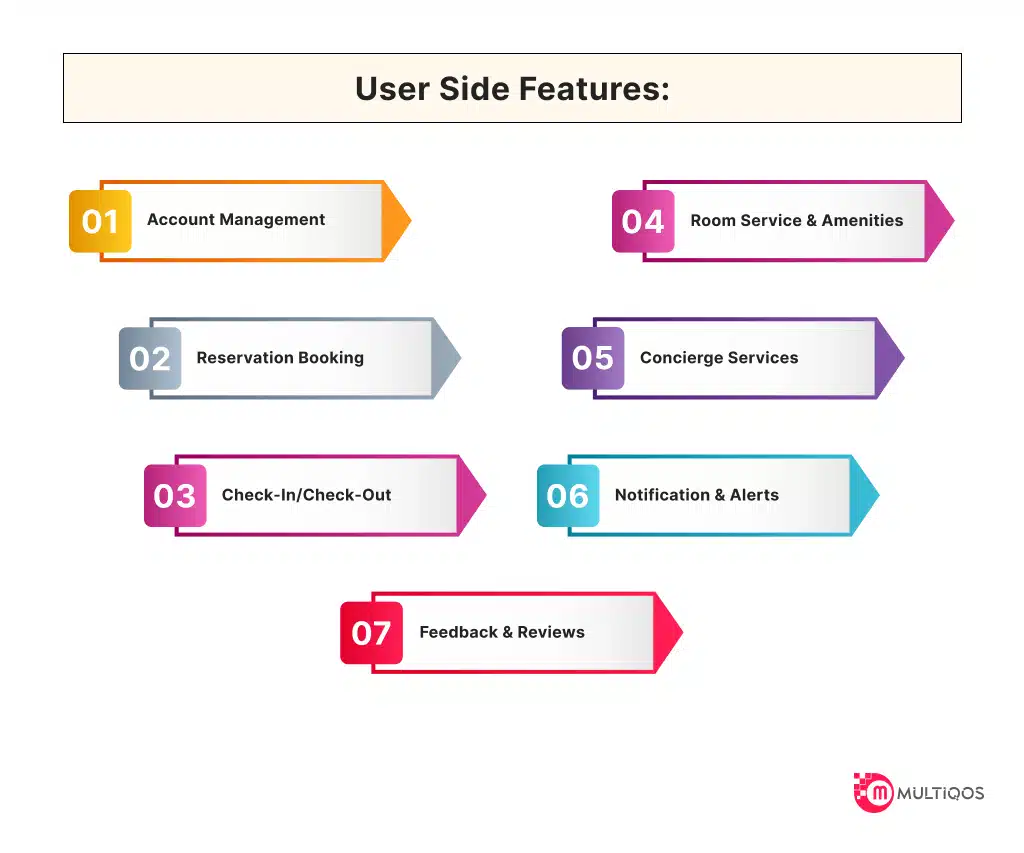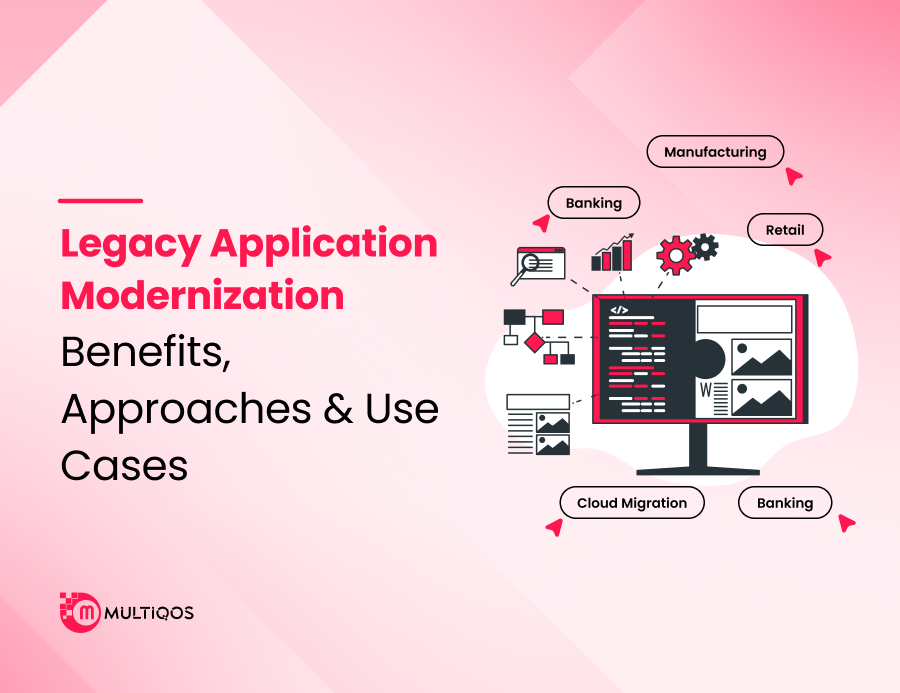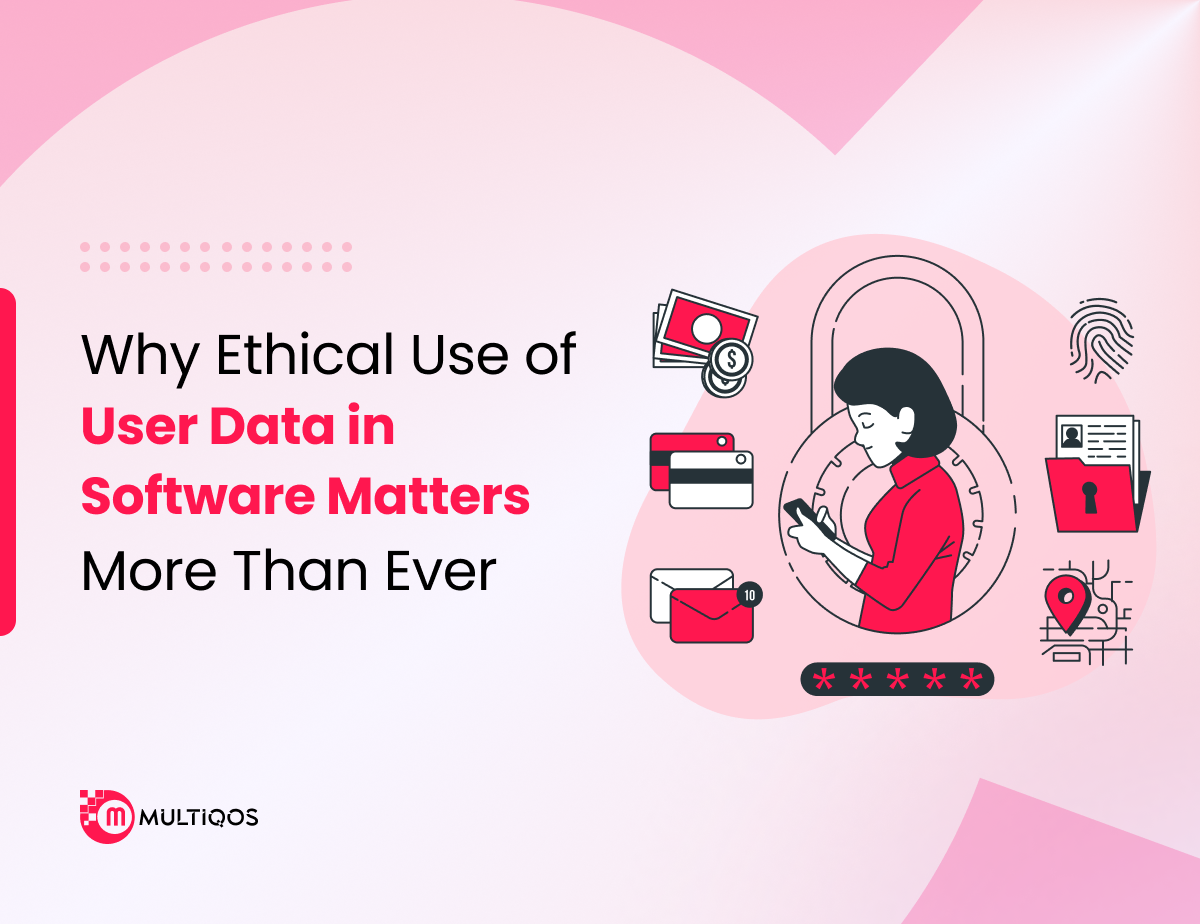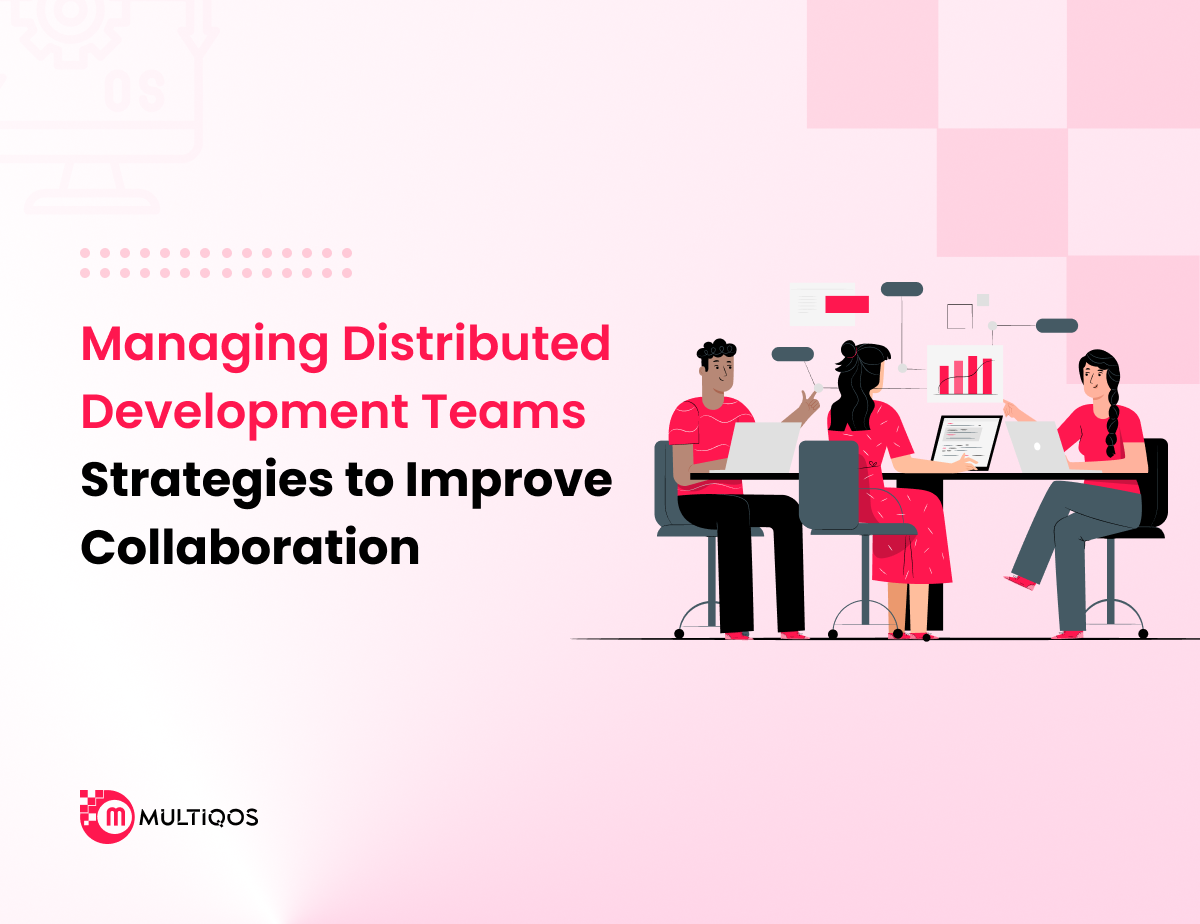Hotel Management Software Development Cost and Features – A Detailed Guide
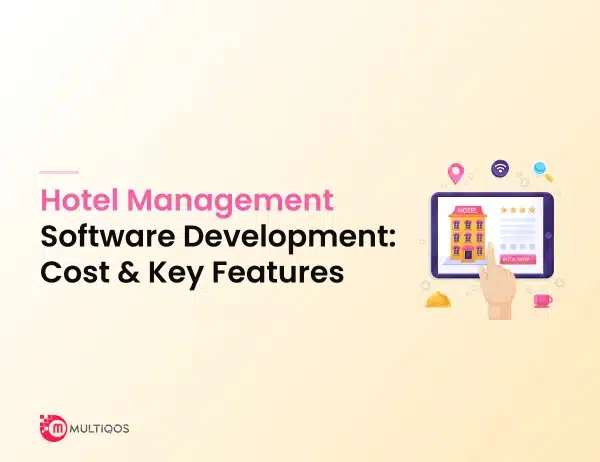
Hotel management software is a crucial aspect of the contemporary hospitality industry. Thus, it makes work and processes smoother, improves guests’ satisfaction, and increases productivity. However creating such software is not without certain costs. Why some of these costs are high is what you need to understand well so that you know how to provide the best value for money spent.
The global market size of the hospitality industry is expected to grow from USD 4.7 trillion in 2023 to USD 5.5 trillion by 2024. The global hotel management software market is expected to grow from USD 13.6 billion in 2022 to USD 49.9 billion by 2027, at a CAGR of 298% during the forecast period.
What is Hotel Management Software?
Hotel management software refers to an all-in-one program that is used to facilitate management of a hotel business. They are frequently characterized by the kinds of services they involve, including reservations, front office, housekeeping, accounting, and customer relationship management (CRM).
Benefits of Hotel Management Software
Hospitality technology solutions particularly hotel management software can provide good ROI through higher efficiency of operations, guest satisfaction, and revenue. It saves time by automating repetitive tasks, eliminates human error and offers possibilities through data analysis.
Types of Hotel Management Software
Hotel Staff Management System
Hotel Staff Management System offers the benefit of time and productivity management for all the employed staff of a hotel. It also increases output by avoiding drawing of resources into administrative work and ensures quality service delivery.
Housekeeping Management Software
The Housekeeping Management Software generates working schedules and monitors the cleaning assignments while offering room status to ensure timely service delivery. It also orders stock for hygiene products to ensure high standards of cleanness are maintained all the time.
Hotel Tour Assistance Software
Hotel Tour Assistance Software involves and coordinates formulating and scheduling of guests’ tours and activities. In turn, it creates an opportunity to improve the guest experience by providing the option of convenient and tailored tours.
Hotel Inventory Management Software
Hotel Inventory Management Software helps to monitor the stock level of reputed items to place the order when required and when it is due. It assists in controlling costs, thereby avoiding situations where a specific product is out of stock or there is an oversupply of the same.
Revenue Management System (RMS)
RMS increases revenue through the analysis of booking data and demand forecasting for room rates and availability. It increases revenue through aspects like flexibility in pricing depending on the demand and the market.
Online Hotel Booking
Online Hotel Booking software enables consumers to book for a hotel through their preferred internet browser or mobile phone. It connects with OTAs and GDS to reflect accurate availability status and limits bookings from third-party sites.
Hotel Property Management System (PMS)
Hotel Property Management System (PMS) encompasses front office, bookings, house charges, guest services etc. It makes day-to-day interactions efficient, and it also offers insights that are helpful in decision making.
Hotel Customer Relationship Management (CRM)
Hotel CRM System is the process of gathering data about the customer and arranging it in a manner to develop customer loyalty and for marketing purposes. It improves customer satisfaction and satisfaction that leads to repeat customers booking the facility.
Features to Add in a Hotel Management Software
Admin Side Features
Staff Management
Staff management includes elements that have optimization functions in terms of staffing schedules, working hours, and proper distribution of tasks, which improves the efficiency of employees. It is useful in handling employee details and promotes interaction among different working units.
Inventory Management
Inventory management allows hotels to track supplies, make inventory and order new products more efficiently. It makes sure that various stock items are present, therefore minimizing formation of operational gaps.
Billing and Invoicing
Financial aspects include billing and invoicing that go a long way in the entire billing process to ensure accurate invoices are produced for payments. This minimizes cases of human errors evident in most check-out processes for the guests.
Reservation Management
Reservation management makes booking easier since it supports real time switching and communications across multiple channels. It prevents two clients booking the same room at the same time, and it is also beneficial to the guest when booking a room.
Security and Access Control
The security and access control measures to prevent unauthorized access or personnel to such areas containing confidential information within the hotel. These tools control the user access and oversee activities in order to minimize or eradicate the probabilities of intrusion.
Maintenance Management
Maintenance management tools are keeping the calendar of maintenance work and to check that all the hotel facilities are in good condition at the right times. This helps in avoiding breakdowns and also the use of assets is more because they last longer.
Analytics and Reporting
Reporting and analysis tools enable many aspects of hotel functioning to be evaluated and analyzed by means of reports and meaningful graphics. Some of these tools assist in coming up with proper decisions to enhance productivity and profitability.
User Side Features
Account Management
Reservation management enables the guest to customize their account by setting up their identity, checking their previous visits, and modifying individual details. This feature would build up a more individualized approach and ease further reservations.
Reservation Booking
Through reservation booking, it would be easy for the guests to know whether their desired rooms are available, select them and book easily. It provides the customer with an easy means to book their intended services without complications.
Check-In/Check-Out
An important aspect of convenience and efficiency in operations is when it comes to check in / check out times of the guests. Mobile check-in features are among these tools, which make the process more convenient and efficient.
Room Service and Amenities
Room service and amenities features allow the concerned guests to order food, services, and book services and amenities from their device. This will improve the experience of guests since they will be served with efficiency and in a timely manner.
Concierge Services
A highly integrated service is the concierge which provides suggestions for travel, dining and entertainment, and arranges bookings for guests. This feature enhances the guest’s experience since the system offers recommendations based on each guest’s profile.
Notification and Alerts
Notifications and alerts ensure that the guest is aware of their bookings, new offers, and changes in hotel affairs. These real time notifications promote integration of communication and interaction with the guests.
Feedback and Reviews
Online feedback and review options let the guests express their impressions and evaluate the accommodation directly in the software. This is important information for the management of hotel to enhance the services with a view of solving any problem out there.
Hotel Management Software Modules You Can Consider Adding
Reservations Management
The reservations management module is considered the central feature of hotel management software. It takes control of the booking process throughout and includes the booking process from the reservation and check-out. This module should have the capability to support multi-channel reservations, through the hotel’s website, mobile application, or other OTAs. It should also have features of showing available rooms at the current moment, confirming the booking, and changing or canceling the booking. It is also important that payment gateways ensure web stores’ security during transactions.
Guest Handling
A guest handling unit guarantees that each of the guests is well attended to offering them professional services during their stay. This module monitors guests’ likes, dislikes, requests, and any kind of events in guest’s life such as birthdays, anniversaries, etc. It can also allow direct interaction with other hotel guests or hotel personnel through messaging systems or using chatbots. Also, it can interact with all related systems, including housekeeping and maintenance, to solve any problem that might occur and improve guest satisfaction.
Sales
The sales module is specifically the process of selling goods and services of the hotel and the maximization of its revenues. This includes managing room rates, packages and offers. There are two primary strategies of pricing that can be adopted depending on the occupancy levels, seasonal variations and competition analysis. The sales module should also promote the selling of related services of the hotel like the restaurant, spa, events venue, etc. Sales reports and the analysis of the results enable monitoring and decision making based on pertinent data.
Customer Relationship Management (CRM)
The CRM module is important for the management of guests and ensuring their loyalty. This module captures and stores guest details like identity, arrival history, and preferences. It allows for targeted advertising, loyalty programs, and special promotions, thus enhancing the satisfaction of its guests. The CRM module also included the monitoring of customer feedback and reviews as feedback for improvement. Integration with social networks or e-mailing systems can also increase participation and communication with customers.
Back Office
The back office module helps to manage and administrate various internal processes and activities. These include accounts, payrolls, staff requirements, and management of stock. This means that it supports the goals of financial reporting, monitoring of expenditures and adherence to the set legal provisions. The back office module is used for organizing work schedules, performances, and training of the staff.. Effective back office operations affect the general functioning of the hotel and enable managers to concentrate on strategic issues concerning the expansion of the firm.
Front Desk
The front desk module includes functions that provide the basis for registration and discharge of guests. They coordinate rooms’ allocation, key cards, and charging. This module should provide real-time information on rooms so that the front desk can assign rooms quickly and efficiently. Other potential services comprise of guest communications, wake up call and concierge services. Front desk as a module simplifies guest’s first and last impressions of the overall stay and is a critical contribution to the guest experience.
Housekeeping
Having a housekeeping module guarantees the rooms to be tidy and prepared for the guests on time. It enables the distribution and monitoring of housekeeping tasks, room status description and controlling of cleaning stock. It is integrated with the reservations and front desk so that the housekeeping schedule can be synchronized with the check-in/out of the guests. Instant communication and feedback provided from the housekeeping staff to the management promote cohesive cleanliness standards.
Channel Management
The channel management module is prevalent in hotels that deal with more than one OTA and GDS channel. It also centralizes control of room inventory and pricing based on various sales channels. This module focuses on the real-time integration and synchronization that holds the key to avoiding overbooking issues. Managing channels optimizes room sales and overall revenues from bookings by tapping into a wider audience pool. It is crucial that integration with the reservations management module is achieved to ensure cohesion.
A Step-by-step Guide on Developing Hotel Management Software
Planning and Analysis
Some of the activities that are involved in this initial stage include: requirement gathering, market analysis and feasibility studies. Normally it should not exceed 15% of the total project cost. This type of planning is very effective in defining the extents of the project and recognizing the possible pitfalls beforehand.
Design and Prototyping
Designing mockups and prototypes makes it easier to foresee the design and the completeness of a structure. This stage can be a mere 15-20% of the total project cost. Prototyping enables the stakeholders to weigh in at some point, before it might be too late to make the same change without having to spend a fortune.
Development and Coding
The core development phase is the most costly, taking up to half of the development budget, namely 40-50%. It includes recording, feature integration and creating functions. Developing quality software needs experienced developers, and the software also must be tested and checked thoroughly.
Testing and Quality Assurance
One of the most important objectives is to make sure that it is as free of bugs as possible and that it runs efficiently. This phase can cost 10-15% of the total budget. There are functional testing, performance testing, and security testing, which is critical for a reliable product.
Deployment and Maintenance
Securing and maintaining the software is as important as implementing it in the long run. These costs often account for 10-20% of the total costs of a project. Software enhancements, patches, and feature releases keep the tool useful for the tasks performed and relevant on the market.
How Much Does It Cost to Develop a Hotel Management Software? Details
Small-Scale Solutions
For small hotels or other basic applicability, development costs can cost between $20,000 and $50,000. Such solutions commonly provide base functionalities such as table reservations and basic analytics.
Mid-Range Solutions
Large-scale motels and hotels with more intricate elements could cost between $50,000 to $150,000. Such solutions may have extra functionalities and options, such as CRM, superior reporting system, or connection to other systems.
Enterprise-Level Solutions
Enterprise level vendors such as large hotel chains or highly specialized solutions can exceed $200,000. Such solutions include integrated features, customized work, along with data analysis tools.
Factors Influencing Hotel Management Software Development Cost
Scope and Scale of the Project
The biggest cost determinants are the scale and complication of the process. That is why a project with more features is going to be more expensive than the one with fewer features. For instance, a small scale boutique hotel might require simple functions as compared to a large chain hotel needing complex features and complex interfaces.
Features and Functionalities
Extra functionalities such as AI-based suggestions, managing many properties at once, and compatibility with other platforms make up the development costs. The complexity of software determines the cost of development the more complex a software needs to be, the more expensive it becomes.
Technology Stack
The type of technology used (languages, frameworks, and tools) or the system under construction has an impact on both development time and cost. Bigger technologies may be quicker but the cost for them is even greater. For example, applying AI and the top technologies for predictive purposes may be more costly, but the advantages are numerous in the long run.
Cost by Development Team Type
In-House Development
In-house teams are more controlled with custom solutions but they are costly in terms of labor and are time consuming to manage. This option is more advisable for companies which require specific applications to be built and have the means to directly hire a development team.
Outsourcing Development
Hiring developers and outsourcing can save much and provide access to experienced individuals regarding particular sectors. But it is advisable when done carefully when choosing the vendors to deal with. Outsourcing can be beneficial, especially when hiring remote developers in countries with lower labor prices.
Hybrid Teams
The integration of in-house and outsourced resources can complement the benefits of both in terms of the control they offer as well as cost. This model proves to be flexible and that has benefits when it comes to handling large and complex projects.
Regional Cost Variations
North America
Development costs are relatively high in North America where $100 to $200 is charged per hour for the development. These are due to high labor costs as well as the demand for professionals that have specialized experience in software development.
Europe
European costs are somewhat lower at $70 to $150 per hour though this is again dependent on the country. Companies in Eastern European countries offer services that are cheaper but with the same results as their more expensive counterparts.
Asia-Pacific
The Asia-Pacific region is quite affordable and mostly in the range of $20 to $70 per hour. There is a large talent pool in countries such as India and the Philippines where you can hire skilled mobile app developers at relatively affordable rates.
Other Regions
Countries in Latin America and Africa are now becoming strategic outsourcing destinations possessing increasing experience in developing software. These regions provide reasonable price levels and the tendency to improve the quality of the products.
Hidden Cost to Consider for Hotel Management Software
Licensing Fees
Soft costs, such as license fees often incorporated in third party software integration also contribute to the total cost. This indicates that these are some fixed expenses that one should consider when creating a budget.
Training and Onboarding
Educating the staff to operate in the new software adds more expenses to bear. Training also enables all your staff to use the software to the maximal potential that is possible.
Ongoing Maintenance
Maintaining the software means making frequent updates, fixing bugs, and offering support to make the use of software fluent. Annual operating costs are normally within a 15-20% range of the initial construction costs.
How to Optimize Hotel Management Software Development Cost?
Agile Development Methodology
Applying effective agility techniques can lower expenses since it is easier to integrate the project as a series of small parts. The agile processes also add flexibility and guarantee that the software is made to fit the use.
Minimum Viable Product (MVP) Approach
An advantage of creating an MVP is that it enables the release of a basic version of the software and then enriches it over time. This approach is useful when it comes to cost containment and prioritizing features to be implemented or adopted first.
Utilizing Pre-Built Modules
Using existing modules can often be quicker and cheaper in the long run compared to building everything from the ground up. The use of templates for the creation of general practices may help lead to better and quicker implementation as well as a lower price tag.
Case Studies
Successful Hotel Management Software Projects
Learning from successful projects gives an idea of organizational techniques and possible errors. For instance, a midscale hotel group that adopted a practical method heard its operation effectiveness improved by 20% within a year.
Lessons Learned from Cost Overruns
Knowing the reasons why some projects go over budget is beneficial in preventing such occurrences. These are mainly due to factors such as the expansion of work beyond the originally planned project, underestimations of the amount of work to be done, and poor planning.
Choosing the Right Development Partner
Criteria for Selection
Choose a partner who has experience in developing for your specific platform, a solid portfolio, and good client feedback. It is important to work with a company that specializes in hotel management software to better understand your unique requirements.
Importance of Experience and Expertise
An experienced partner has more understanding of the business and methods ensuring that the business does not risk more cash. They can oversee the development process and provide the best solutions to individuals in the shortest time possible.
ROI and Long-Term Benefits
Measuring ROI
Determine the ROI by ascertaining the cost of the software, as well as the operations and revenue the software saves or makes. Quantifiable values such as increased occupancy rates and lower operating costs are perhaps the best ways to show the value of using the software.
Long-Term Savings and Benefits
Making an investment in quality software is money well spent because it results in savings and increased guest satisfaction. In the long run, more positive outcomes such as efficiency, desirable guest experiences cover the deficits incurred at the beginning.
Conclusion
It is important to estimate potential costs that are associated with the creation of hotel management software. Thus, when taking everything into account – from features to development stages and regions – a properly allocated budget will allow for the maximization of ROI. Selecting the right software development company and using cost controlling techniques can help carry out the projects effectively.
FAQ on Hotel Management Software Development
The development timeline can vary based on the project’s complexity, but typically it ranges from 6 months to over a year. Detailed planning and agile methodologies can also play a crucial role in the process.
Yes, most hotel management software can be customized post-deployment to adapt to changing needs. Ongoing customization ensures that the software continues to meet your evolving requirements.
Yes, reputable cloud providers implement robust security measures to protect your data. Regular updates and security protocols ensure that your information is safe from threats.
Focus on features that address your specific operational needs and enhance guest experience, such as reservation management and CRM. Consulting with experienced developers can help identify the most valuable features.
Get In Touch


